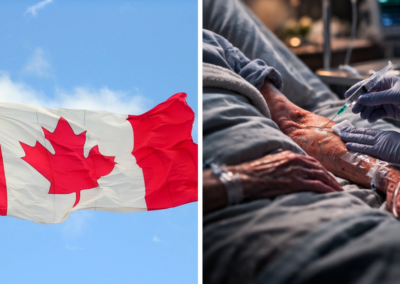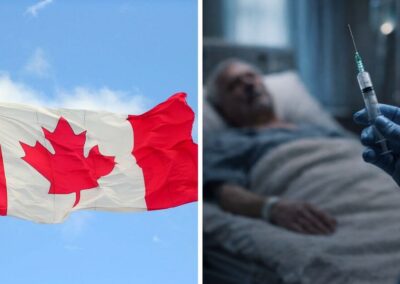A Canadian hospice has said that it is being forced to lay off clinical staff and faces eviction because those operating the hospice have refused to participate in euthanasia of their patients.
The 10-bed Irene Thomas Hospice in Ladner, British Columbia, is run by the Delta Hospice Society (DHS), who feel they are “being compelled” to take this action due to the likely eviction and loss of funding.
The health authority, Fraser Health, owns the land on which the hospice operates and said it would cancel the society’s service agreement and lease as of the 25th February 2021. This will result in the loss of $1.5 million in annual funding which had covered most of the hospice’s costs of operation.
A press release from DHS said:
“The board of DHS deeply regrets being compelled to take this action. Tragically […] we have been left no other choice due to the Fraser Health Authority cancelling our service agreement and 35-year lease. Fraser Health is about to evict us and expropriate approximately $1.5 million of our assets simply because we decline to euthanize our patients…”
“To be clear, we accept that the provision of [euthanasia] is an elective, legal service across Canada. Nothing in Canadian law, however, requires medically assisted death to be made available everywhere, at all times, to everyone. The Constitution of our private Society and our commitment to palliative care, bars us from offering it. Neither the board of the DHS, nor the vast majority of our patients and members want to change that”.
While euthanasia has been legal in Canada since 2016, the society running the hospice states that this does not mean they are required to offer it.
The board president of DHS, Angelina Ireland, said the hospice was a “sanctuary” for dying people who did not want to be in a facility that provided euthanasia.
“These people as Canadians have a right to be in a place where there is not [euthanasia] offered”.
The board president went on to say that there was in fact a facility next door to the Irene Thomas Hospice that did offer euthanasia if that is what patients wanted.
Expanding euthanasia law in Canada
Since the expansion of the euthanasia law in Canada in 2019 – where the legal requirement that a person be terminally ill before administration of euthanasia was dropped – an elderly woman in Canada was euthanised to avoid having to live through another COVID-19 lockdown.
Euthanasia advocates are continuing to push for an expanded euthanasia law. Bill C-7, which is currently being debated in the Canadian Parliament, intends to further extend euthanasia legislation to people with disabilities and those with mental health problems.
Expansion of euthanasia legislation is common in other countries too. In the Netherlands, where euthanasia has been legal since 2002, doctors are now permitted to secretly sedate patients who have dementia before euthanising them. The law permits voluntary euthanasia for anyone over the age of 16, and children age 13-15 can be euthanised with their parents’ consent. Earlier this year, the Dutch government said it would be changing the regulations to allow doctors to end the lives of terminally ill children between the ages of one and twelve.
Right To Life UK spokesperson, Catherine Robinson, said:
“Presumably when patients enter the DHS hospice, they and their families, are fully aware that the hospice does not offer euthanasia. Any person wanting to be offered euthanasia, or family wanting euthanasia for a loved one, is able to attend another facility where this service is offered. There is in fact another facility next door to the hospice that offers precisely that”.
“It seems though, quite clearly, that DHS is being punished for the ethical stance they have taken against euthanasia. Those at Fraser Health, and at least some members of the assisted suicide and euthanasia lobby in Canada, will apparently not accept any dissent on this matter. This hospice provides an option for those patients and families who do not want to have euthanasia taking place in the hospice they are staying in. Forcing the facility to perform euthanasia is not only deeply illiberal, but also undermines the care of patients who want to spend the final part of their lives in a hospice that is not also euthanasing other patients”.












